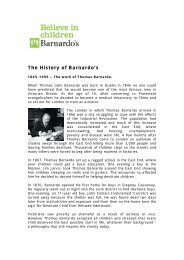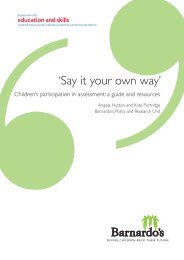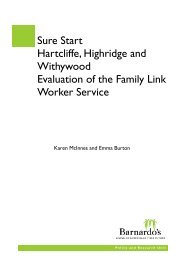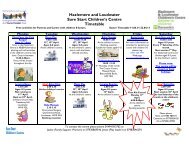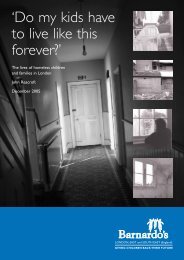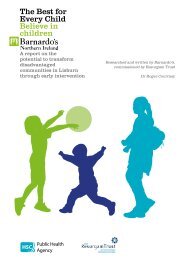Splintered Lives - Barnardo's
Splintered Lives - Barnardo's
Splintered Lives - Barnardo's
Create successful ePaper yourself
Turn your PDF publications into a flip-book with our unique Google optimized e-Paper software.
their experience, for example, badness, shame and guilt. They learn this both from<br />
explicit and implicit behaviours of their abuser/s and the silence and other responses<br />
they encounter more generally. Where abuse includes sexual exploitation additional<br />
levels of stigma and social meaning are added. For example, where a permanent record<br />
(or records) have been made of one's abuse and/or where one is known by police or<br />
other agencies to have been selling sex. Much of the literature on adult women who do<br />
sex work refers to this as a stigmatised identity. Telling others, seeking support, is,<br />
therefore, fraught with concerns about being seen and treated in particular ways.<br />
Betrayal<br />
Where the abuser is someone the child ought to have been able to trust, especially a<br />
family member or carer, one of the most damaging elements is the betrayal of this trust.<br />
This applies, though, to any situation where the process of entrapment has involved<br />
gaining a child's trust, and possibly even their affection and loyalty. Children who are<br />
involved in organised sexual abuse rings frequently have their trust betrayed and<br />
manipulated in multiple ways, and children who have been sold into sexual slavery by<br />
their parents are likely to experience this as an intense betrayal. Surviving on the street<br />
often necessitates beginning from a basic position of mistrust. On the other side,<br />
especially for young children, they may still long for non-abusive care and affection. This<br />
potent combination can result in contradictory and inconsistent behaviour. The<br />
disruption of trust has clear implications both for the willingness of children and young<br />
people to talk about what has happened to them, and for longer term supportive work.<br />
All potential supporters need to begin from understanding that they have to continually<br />
demonstrate that they are trustworthy.<br />
Powerlessness<br />
The experience of ongoing and/or repeated abuse involves being repeatedly denied<br />
choice, control and safety. This is further reinforced when attempts to avoid, limit and/or<br />
stop abuse are frustrated and when attempts to make others understand fail. A sense of<br />
efficacy, being able to make a difference is undermined. Being unable to prevent others<br />
seeing recorded evidence of one's abuse is an obvious example, as may be the lack of<br />
alternatives to prostitution for young runaways. In these circumstances telling anyone<br />
else may be, justifiably, perceived as a pointless gesture.<br />
Enforced silence<br />
In the majority of cases of ongoing abuse the abuser uses a range of strategies to<br />
enforce silence. Specific threats about the consequences of telling are extremely<br />
effective and may include physical threats as well as statements about the 'victim' not<br />
being believed and/or being blamed. These latter threats have additional power in a<br />
social context where children and adults are aware, either from personal experience or<br />
imputed knowledge, that this may indeed be the response of others. We have already<br />
noted the additional levels of coercive control used by organised rings. The existence of<br />
pornographic records in which the child or young person has feigned enjoyment will act<br />
as a powerful silencer, as will being involved in the recruitment of others onto organised<br />
networks.<br />
PAGE 53<br />
chapter<br />
8




